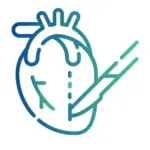
Cardiology and cardiothoracic surgery encompass a wide spectrum of conditions that affect the heart, lungs, and associated vascular structures. These can range from lifestyle-induced cardiac disorders to congenital and degenerative thoracic diseases requiring surgical management.
Common cardiac conditions treated include:
Conditions that may require surgical intervention include:
Early diagnosis and targeted intervention are critical in preventing progression and avoiding emergency scenarios. Cardiologists and surgeons work collaboratively to develop treatment pathways tailored to each patient’s diagnosis and long-term prognosis.
The treatment landscape in cardiology and cardiothoracic surgery has significantly evolved with innovations in technology and surgical methods. Treatment options are chosen based on the severity, progression, and underlying cause of the condition.
Non-surgical cardiology treatments include:
Cardiothoracic procedures include:
Minimally invasive approaches like robotic-assisted surgeries and video-assisted thoracoscopic surgeries (VATS) offer quicker recovery, less scarring, and lower postoperative complications. Patients benefit from a multidisciplinary care model, integrating cardiology, surgery, anesthesia, and critical care to ensure successful outcomes with reduced hospital stays and improved quality of life.
A comprehensive cardiology and cardiothoracic program delivers a wide range of diagnostic, therapeutic, and surgical services under one integrated platform. These services are designed to cater to both routine and emergency cardiovascular needs.
Key services include:
Additional support services:
Each service is supported by state-of-the-art equipment and performed by highly trained medical professionals. Patient safety, comfort, and outcomes are prioritized at every step, ensuring that both outpatient and inpatient experiences are managed with clinical precision and personalized attention.
Excellence in cardiology and cardiothoracic surgery is defined not just by the range of services offered but also by the features that enhance safety, efficiency, and outcomes. Modern cardiovascular centers invest in advanced infrastructure and team-based care to support patients across every stage of their journey.
Distinctive features include:
Specialized clinical teams:
Patient-centered design:
These features not only reduce procedural risks but also support faster recovery and fewer readmissions. The use of digital innovations, patient education, and real-time diagnostics ensures a safer, more informed healing journey for every patient.
Postoperative care in cardiology and cardiothoracic surgery plays a crucial role in determining the long-term success of the treatment. A structured and closely monitored recovery phase ensures that patients regain functionality, prevent complications, and achieve their best possible health outcomes.
Standard practices include:
Rehabilitation and counseling:
Patient education is a cornerstone of post-op care. Patients are trained to identify warning signs, adhere to medication regimens, and manage co-existing conditions such as diabetes or hypertension. This holistic approach ensures a smooth transition from hospital to home while minimizing the risk of recurrence or complications.
Cardiology and cardiothoracic surgery represent a cornerstone of modern healthcare, offering life-saving diagnostics and procedures that restore function, extend life expectancy, and improve quality of life. With the seamless integration of non-invasive cardiology, advanced imaging, and surgical innovation, patients benefit from comprehensive, personalized care tailored to their unique condition. Early detection, timely intervention, and meticulous postoperative practices are vital in reducing the burden of cardiovascular diseases and associated complications.
At Oxford Hospitals, patients receive the highest standard of cardiac and thoracic care, supported by world-class infrastructure, experienced clinicians, and a patient-first philosophy. Every step—from initial assessment to post-surgical rehabilitation—is handled with precision, compassion, and a commitment to clinical excellence.
Cardiology focuses on diagnosing and managing heart diseases using medications, imaging, and minimally invasive procedures, while cardiothoracic surgery involves performing surgical interventions on the heart, lungs, and chest organs. Cardiologists may treat arrhythmias and hypertension, whereas cardiothoracic surgeons perform bypass surgeries, valve replacements, and lung resections. Both specialties collaborate to provide comprehensive care for cardiovascular and thoracic conditions.
The salary of a cardiac surgeon can vary widely based on experience, geographic location, and institutional reputation. In developed countries, it typically ranges from $300,000 to $600,000 annually, while in emerging markets it may be lower. Senior surgeons in high-volume centers often earn more due to complex procedures, academic affiliations, or leadership roles. Additional compensation may come from consultations or private practice engagements.
The scope of a cardiothoracic surgeon includes performing surgical procedures on the heart, lungs, esophagus, and major vessels within the chest. They handle both elective and emergency surgeries, from bypass grafting to lung resections and aortic repairs. With growing access to robotic and minimally invasive techniques, their role continues to evolve, addressing both congenital and acquired diseases in patients of all age groups.
A cardiothoracic surgery involves surgical treatment of diseases affecting organs inside the chest. This includes procedures such as coronary artery bypass grafting, valve repair or replacement, and lung tumor removal. Surgeons make precise incisions, repair or remove affected tissues, and restore normal function. The surgery requires advanced planning, state-of-the-art tools, and post-operative care to ensure the best possible recovery and long-term success.